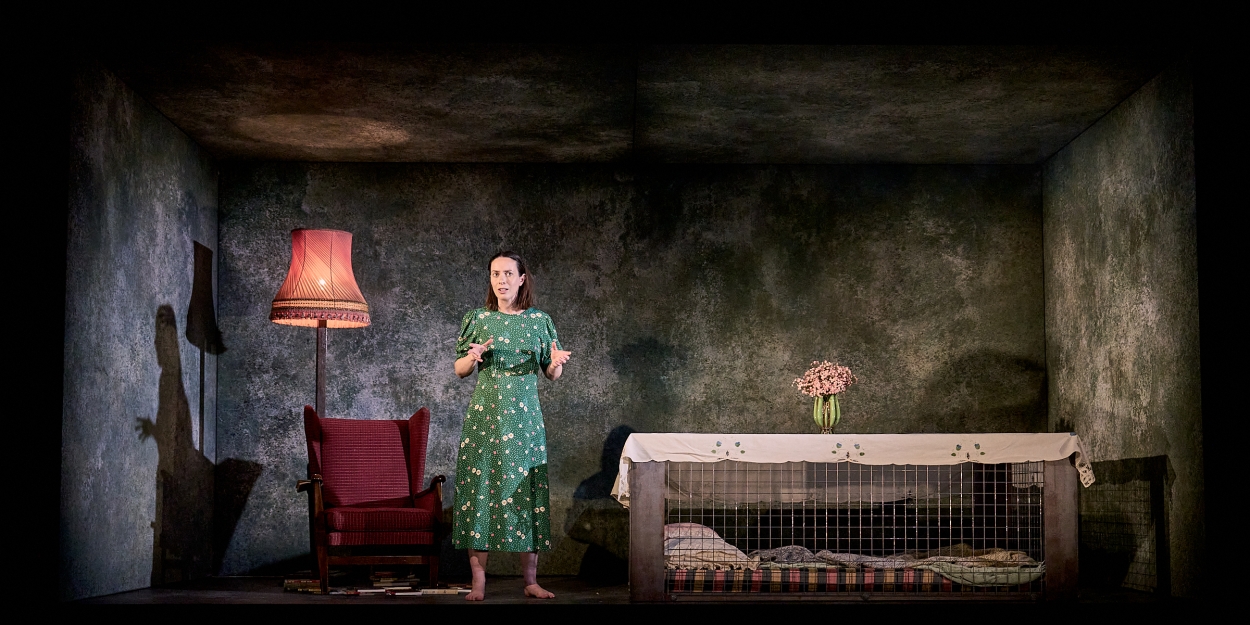Review: ALL OF IT, Royal Court Theatre
Alistair McDowall’s nightmarish triptych runs until 17 June

![]() This is the kind of production that slaps the audience in the face and expects them to apologise.
This is the kind of production that slaps the audience in the face and expects them to apologise.
Alistair McDowall’s new triptych of plays are osentibly united by a sonorous division between outer and inner worlds with the former menacingly impinging on the latter. Together they paint an image of a vast valley; on one side banality, on the other existential terror. All of life’s intangible knots, unassailable miseries, and untameable desires lie somewhere between the void.
In the first monologue, Northleigh 1940, the threat of bombs from whirring warplanes is the external menace, a chilling counterpoint to the unnamed protagonist’s failure to process her mother’s death. She lies in a cage waiting for a dirt-lined house to collapse in on her, the boundaries between the two worlds buckling.
In the second, In Stereo, a woman encounters their double in a Freudian cocktail of Gogol and Charlotte Perkins Gilman’s The Yellow Wallpaper. A cacophonous chorus of fractured voices ramps up schizophrenic terror. It quickly morphs into genre bending horror, McDowall’s thematic calling card, as her double appears in a television screen and faces down the audience.
In Stereo is the most psychologically potent but also the most self-consciously theatrical; director Sam Pritchard (who helms the first two) treats us to a Beckettian homage quoting the unencumbered mouth from Beckett’s Not I. Here it is a levitating head surrounded by oppressive darkness.
The final monologue, all of it, directed by Vicky Featherstone, plays out like a developing polaroid. It is a snapshot of a life, with flickering details, birth, growth, adolescent anxiety, midlife marriage, children, decline, doubt, regret and death, fading into view. Death is a marauding motif underpinning the three, each of the women contemplate its finality, its silence, its inevitability.
Even though all of it is the only one of the three written pre-pandemic, you can sense the lockdown anxiety woven into the three's DNA. The women are trapped between mental and physical barriers. But McDowall once again surreptitiously subverts expectation: None of them yearn to transcend. Rather they just seek solace within the boundary of their restraints, a cage, a body, a life. They can do nothing else. Is that tragic or liberating? It’s up to us to decide.
On paper none of it could possibly work. Each page of the playtext is a formless smudge of words and images rendered with a Schoenberg-like atonality. Yet like an exorcist or a witch doctor, Kate O’Flynn conjures its magic from beneath the ink. She effortlessly wields McDowall’s semi-poetic language like a syringe. Smooth and understated, you can barely feel her prick your skin with her disarmingly nonchalant presence. Before you realise it, O’Flynn has burrowed into your veins injecting you with icy anaesthetic. You are under her spell. Totally powerless.
all of it plays at The Royal Court Theatre until 17 June
Photo Credit: Manuel Harlan
Reader Reviews

Videos

